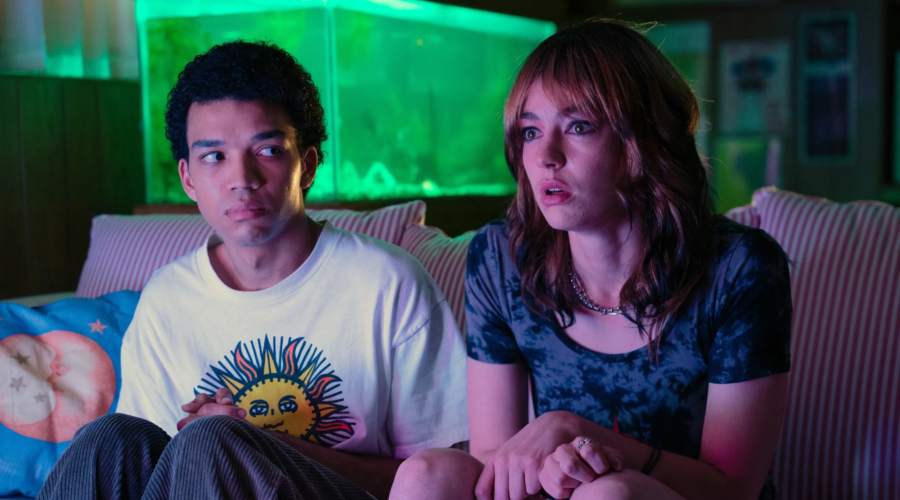Late in I Saw the TV Glow, Owen — physically diminished, wracked with chronic asthma — still works in a family entertainment centre, all ball pits and insincerity. Owen is peripheral, a flicker of humanity winking in and out of existence amongst the forced hilarity of birthday parties, markers of the human condition edging us ever closer to the end even when we are at our youngest, hopeful for the years ready to unspool neatly rather than video tape spewed out and twisted beyond repair between the heads of a VHS recorder.
Then Owen screams. Screams for his mother to save him. Begs her. The horrific realisation that no one else is coming to save you. The realisation that no one else cares. The scream fails to connect with any of his co-workers or guests, party hats and birthday cake are dispassionate to Owen’s fate. Owen alone is screaming into the void and the void is ceaseless in its depths, all-consuming and unforgiving. Later Owen will apologise for that cathartic outburst, but the universe is indifferent to apologies in the same manner the universe is indifferent to suffering.
Growing up in 1990s suburbia as a seventh grader, Owen scrapes a meagre existence as a human being. He is quiet, reserved, his mother loves him, but the distance is growing. His father is a figure that looms in the front room, sitting on the sofa bathed in the glow of his television set. Owen is obsessed with a young adult fantasy show, The Pink Opaque, but is unable to watch it due to bedtime curfew. Like the greatest unobtainable works of art, The Pink Opaque grows and festers in Owen’s mind, pieced together in his imagination from trailers, episode guides, and magazine articles. Owen’s father dismisses The Pink Opaque: “isn’t that a show for girls?”
A chance meeting with an older student, Maddy, gives Owen the tenuous connection he’s been yearning for. Maddy is insular and monotone, but to Owen, Maddy is the conduit to maturity, a scholar of The Pink Opaque, his spirit guide to the mythology of the show. Maddy gains that spark you get when you suddenly realise you have a devotee, someone who relishes the same piece of cultural archaeology thought discarded by the masses, despite viewing figures in the millions. Pre internet, these connections were lifelines in tumultuous oceans, something and someone to cling onto when your world made no sense.
As the years unfold, Maddy records the shows and leaves them in the school dark room for Owen to discover and rewatch endlessly, reading Maddy’s copious notes and theories. As a thesis on fandom, I Saw the TV Glow spirits the wonder and tragedy of holding onto nostalgia for too long. The infantilization of Western culture as shows that were meant to stay in our memories and filter into dreams became easily obtainable, endlessly mined and regurgitated. They made us retreat into ourselves rather than forge ahead and discover new idiosyncratic art, instead of streaming our imaginations into content oblivion.
The Pink Opaque is clearly indebted to Buffy the Vampire Slayer and Power Rangers but the staggering ending of this imaginary show, as recounted by Maddy, is surprisingly bleak. There is a Lynchian savagery in these scenes in much the same way as Agent Dale Cooper is possessed by Killer Bob in the finale of Twin Peaks – the other touchstone that I Saw the TV Glow wilfully leans into. There are even echoes of an even more esoteric show than Twin Peaks that seeps into the consciousness, that of Sapphire & Steel, interdimensional operatives guarding the continual flow of time until they are trapped for eternity after being lured into a motorway café, a cliffhanger for a projected series that never materialised and instead became something infinite and tragic.
The degree of difficulty I Saw the TV Glow operates in is astounding. At one point during a breathtaking monologue by Maddy inside a digital planetarium, we realise we could be watching the long-awaited sixth season of The Pink Opaque, an event as seismic and as transgressive as Twin Peaks: The Return, or Maddy’s heartfelt plea to Owen to come out as trans, become Isobel from The Pink Opaque, that “egg crack” moment as director Jane Schoenbrun puts it, when they realise their identity does not meld with their assigned gender.
I Saw the TV Glow is directed and edited with equal abandon and assuredness, the dream state and nightmares of David Lynch coupled with the mundane tracking shots of teenagers walking in Alan Clarke’s Christine. The lead performances from Justice Smith as Owen and Brigette Lundy-Paine as Maddy are devastating, heartfelt, and fittingly transformative.

